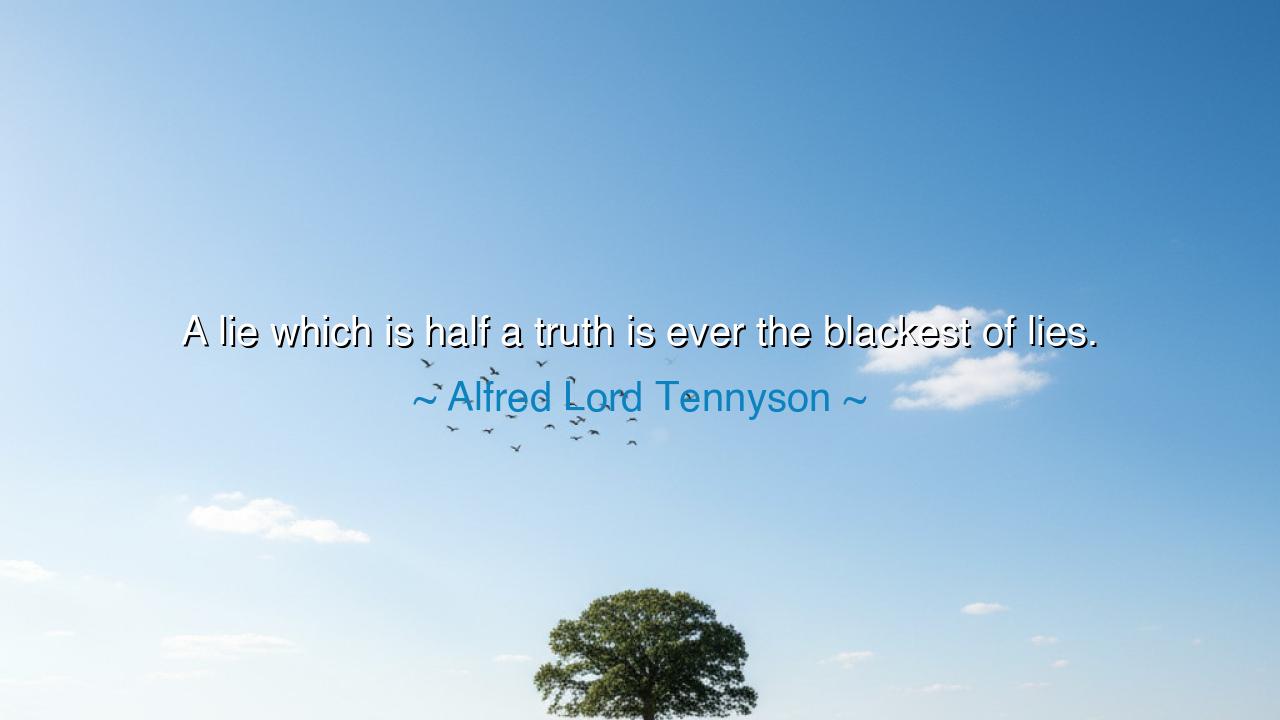
A lie which is half a truth is ever the blackest of lies.






"A lie which is half a truth is ever the blackest of lies." — so warned Alfred Lord Tennyson, the Poet Laureate of Victorian England, whose words often carried not only beauty but grave instruction. In this saying, he points to a subtle danger greater than the outright falsehood: the half-truth, which cloaks deception in the garments of honesty. For a full lie is easily unmasked, but a half-truth carries the poison of deceit while wearing the face of truth, and so it can wound the mind and corrupt the heart far more deeply.
Tennyson, living in an age of political maneuvering, social upheaval, and religious questioning, knew well the treacherous power of words. His warning is timeless: that men are more easily misled when fragments of truth are woven into falsehood. For when truth and lie are mingled, the conscience hesitates, the judgment falters, and the deception slips past the guard of reason. Thus, the blackest lie is not the bold denial of reality, but the lie that uses truth as its disguise.
History bears witness to this peril. Consider the propaganda of Nazi Germany, which did not invent falsehoods alone, but twisted half-truths into weapons. They pointed to real grievances — economic hardship, national humiliation — but fused them with lies about scapegoats and fabricated conspiracies. The half-truth gave credibility to the lie, and millions were led into darkness. This is Tennyson’s wisdom made flesh: the deadliest lies are those built on fragments of reality, for they deceive not only the ignorant, but even the wise who fail to look deeper.
Or consider the trial of Socrates in ancient Athens. His accusers did not fabricate everything they said; they used half-truths. Yes, Socrates questioned the youth. Yes, he challenged traditions. But they twisted these truths into charges of corruption and impiety. The partial truth lent weight to the accusation, but the distortion turned it into a lie. And so Athens, deceived by the blackest of lies, condemned one of its greatest sons.
This teaching is a call to vigilance. It is easy to dismiss a blatant falsehood, but far harder to discern the half-truth. The ear hears the ring of reality and is lulled into trust, but the hidden poison works unseen. Tennyson calls us, therefore, to sharpen our discernment, to test every statement fully, and to recognize that truth which is partial can become more dangerous than falsehood which is total. For the half-truth betrays not only fact, but trust itself.
The lesson, O seeker, is this: do not be content with fragments of truth. Seek the whole, even if it demands labor, even if it reveals what you do not wish to hear. Do not repeat words that seem true on the surface until you have tested their depth. And when you speak, do not cloak lies with truth, for in doing so you commit the gravest betrayal. Better to be wrong in honesty than to deceive in half-truths.
Practical action lies before us. When you hear claims, investigate them. When you read words, ask who speaks and what they hide. When you speak yourself, let your words be whole, not twisted for advantage. And teach the young to recognize the danger of half-truths, for in every age they are the tools of manipulation. For in following Tennyson’s wisdom, you will guard your heart against corruption and your society against deceit.
Thus, let his words endure: “A lie which is half a truth is ever the blackest of lies.” Do not be deceived by what seems partly honest. Truth must be whole, or it becomes corruption. Guard yourself, therefore, against the half-truth, for it is a serpent in the clothing of light, and its bite is darker than any open falsehood.






HTHue Tran
This quote speaks to the manipulation that can happen through selective truth-telling. It makes me wonder about the ethical implications of sharing only parts of the truth—whether it’s in politics, media, or personal relationships. How often do we justify withholding information, believing that people can handle only part of the truth? Could this create more harm than good in the long run, as Tennyson suggests?
TCNguyen Tan Cuong
I find Tennyson’s perspective on half-truths quite compelling. It seems like a clever way to make a lie appear less harmful, yet it’s the very partial nature of the truth that makes it so dangerous. Can we ever be fully certain that we are not being misled in situations where only pieces of the truth are provided? Is the half-truth truly the darkest of lies, or is it a reflection of the complexity of truth itself?
TTThinh Tran
Tennyson’s insight seems to suggest that the intention behind sharing only half the truth is what makes it the worst kind of lie. But is it always clear whether someone is giving us a half-truth with malicious intent, or are there times when it’s simply a matter of perspective? Can a half-truth ever be acceptable, or should it always be treated with skepticism?
LVLam Vo
This quote makes me reflect on how much more dangerous a half-truth can be compared to a full lie. Could it be that partial truths are more harmful because they give us just enough information to form a false conclusion? In our everyday lives, how many times do we make judgments based on incomplete information, believing it to be true, when in fact it’s only half the story?
VDtran van dien
Tennyson’s quote highlights the danger of partial truths, which can be even more deceptive than outright lies. But how often do we encounter situations where only part of the truth is shared, and we are left to fill in the gaps? Is it always intentional, or can it sometimes be a result of omission or misunderstanding? It makes me question how often we fall victim to the half-truths around us.